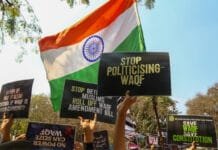The Patna High Court has delivered a verdict declaring the 65% reservation in Bihar for Scheduled Castes (SC), Scheduled Tribes (ST), Extremely Backward Classes (EBC), and Other Backward Classes (OBC) as unconstitutional. This decision overturns a previous law implemented by the Bihar government under the Mahagathbandhan coalition, led by Chief Minister Nitish Kumar. The court’s ruling effectively reduces the reservation percentage back to the original 50%, impacting educational institutions and government job sectors across the state.
Background and Legislative History
The controversy stems from the government’s decision during the Mahagathbandhan regime to increase reservation quotas based on caste census data. The move, which aimed to address historical social disparities, saw the reservation percentage raised to 65%. This decision was heavily endorsed by political parties, including the Rashtriya Janata Dal (RJD), which highlighted it as a cornerstone achievement during the Lok Sabha elections of 2024.
Legal Challenge and Court Proceedings
However, the validity of this decision was recently challenged in the Patna High Court. The court, in its ruling, concluded that the Bihar government’s law providing for 65% reservation violates constitutional provisions. The decision was based on the principle that excessive reservation could potentially infringe upon the rights of other communities and compromise merit-based opportunities in education and employment.
Implications for Governance and Policy
The Patna High Court’s verdict marks a significant setback for the Nitish Kumar-led administration, raising questions about the future of reservation policies in Bihar. With the reinstatement of the 50% reservation cap, the state will revert to its previous framework, which balances affirmative action with ensuring equal opportunities for all sections of society.
Political and Social Reactions
Following the court’s decision, reactions have been mixed within political circles and among the public. While proponents of the 65% reservation argue for greater inclusivity and social justice, opponents raise concerns about the impact on overall governance efficiency and fairness in resource allocation.
Future Prospects and Challenges
Looking ahead, the Bihar government faces the challenge of reconciling social equity objectives with constitutional provisions. The verdict prompts a reevaluation of legislative approaches towards affirmative action, potentially paving the way for more nuanced policies that uphold both social justice and constitutional integrity.
Conclusion
In conclusion, the Patna High Court’s declaration of the 65% reservation in Bihar as unconstitutional marks a pivotal moment in the state’s legislative landscape. The decision not only underscores the judiciary’s role in upholding constitutional principles but also necessitates a critical review of reservation policies nationwide. As Bihar navigates these legal and social dynamics, the implications of this verdict are likely to resonate far beyond the state, shaping broader conversations on equality, meritocracy, and inclusive growth in contemporary India.
















